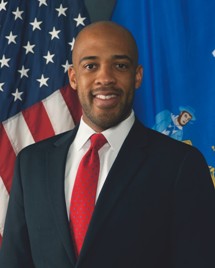Mandela Barnes Seeks Electoral First in Wisconsin
No sitting or former lieutenant governor has won a U.S. Senate election in Wisconsin history

Although no non-partisan, non-campaign affiliated polling has been conducted of Wisconsin’s 2022 U.S. Senate race, first-term Lieutenant Governor Mandela Barnes was immediately cast as the front-runner for the Democratic nomination after the launch of his campaign in July.
The crowded Democratic field already includes one candidate – Sarah Godlewski – who is seeking to make history as the first sitting or former Wisconsin Treasurer to serve in the U.S. Senate.
Barnes is also looking to record an electoral first in the state by becoming the only sitting or former Wisconsin lieutenant governor to serve in the nation’s upper legislative chamber.
Prior to 2022, only five former or sitting lieutenant governors have appeared on a primary or general election ballot in Wisconsin. Barnes is the state’s first Democratic LG to launch such a campaign.
The first primary election for the office in 1914 actually saw two lieutenant governors run for their party’s nomination for U.S. Senator.
Sitting two-term Lieutenant Governor Thomas Morris (1911-1915) placed third in the GOP primary with 22.6 percent – 9.7 points behind Governor Francis McGovern and 0.1-point behind former Attorney General Levi Bancroft.
Morris’ predecessor, Republican John Strange (1909-1911), also sought the GOP nomination that cycle, but placed fourth with 10.4 percent of the vote in the six-candidate field.
The next lieutenant governor from Wisconsin to run for the U.S. Senate was Progressive Herman Ekern (1938-1939) in 1938.
Ekern, a former Republican Attorney General (1923-1927) and Assembly Speaker, had received a controversial appointment to the office in May of 1938 by Progressive Governor Philip La Follette to fill the vacancy of Henry Gunderson more than a half-year after he resigned to serve on the Wisconsin Tax Commission.
Ekern’s appointment was legally upheld, and he went on to narrowly win the Progressive nomination for U.S. Senator that September by 6.0 points over Republican-turned-Progressive U.S. Representative Thomas Amlie.
But Ekern finished in a distant second in the general election – losing by 21.1 points to Republican Chippewa Falls attorney Alexander Wiley with Democratic incumbent F. Ryan Duffy placing third.
Nearly 20 years later, Lieutenant Governor Warren Knowles (1955-1959, 1961-1963) was one of seven Republicans seeking their party’s nomination in a July 1957 special primary following the death of Senator Joseph McCarthy in early May.
Former Governor Walter Kohler was the plurality winner of that race with Knowles receiving 7.6 percent of the vote in fourth place also trailing former U.S. Representative Glenn Davis and sitting Congressman Alvin O’Konski.
The most recent Wisconsin lieutenant governor to launch a primary campaign for the U.S. Senate was Russell Olson (1979-1983) in 1980.
Olson, a farmer and former long-serving state Assemblyman from southeastern Wisconsin, was on the job less than a year and a half when he announced his U.S. Senate candidacy on June 26, 1980.
Lieutenant Governor Olson finished last in the four-candidate GOP primary field with just 11.2 percent, more than 25 points behind former U.S. Representative Bob Kasten.
Prior to the direct election of U.S. Senators, a handful of sitting and former lieutenant governors sporadically received a handful of votes from their party’s state legislative caucus in U.S. Senate nomination voting or in the general election including Republican Edward Salomon (1862) in 1869, Democrat-turned-Republican James Lewis (1854-1856) in 1875, 1879, and 1881, Democrat Charles Parker (1874-1878) in 1881, and Republican James Bingham (1878-1882) in 1881.
It should also be noted that four years before he was elected lieutenant governor in 1986, Scott McCallum was the GOP nominee for U.S. Senate in 1982, losing the general election to William Proxmire.
The Wisconsin primary is August 9th.
Follow Smart Politics on Twitter.

For _his_ part, “Ron” Johnson is bidding to become only the second Republican to win a third six-year term, 1) via direct popular vote and 2) as the party nominee (Alexander Wiley won in 1938, 1944, 1950, and 1956, fulfilling both of the aforementioned criteria).